เวทีประกวด “เกษตรกรสำนึกรักบ้านเกิด” ปีที่ 9 เผย 3 เทรนด์แรงเกษตรไทย “เกษตรเชิงข้อมูล – พลังงานหมุนเวียน – ชีววิธี”
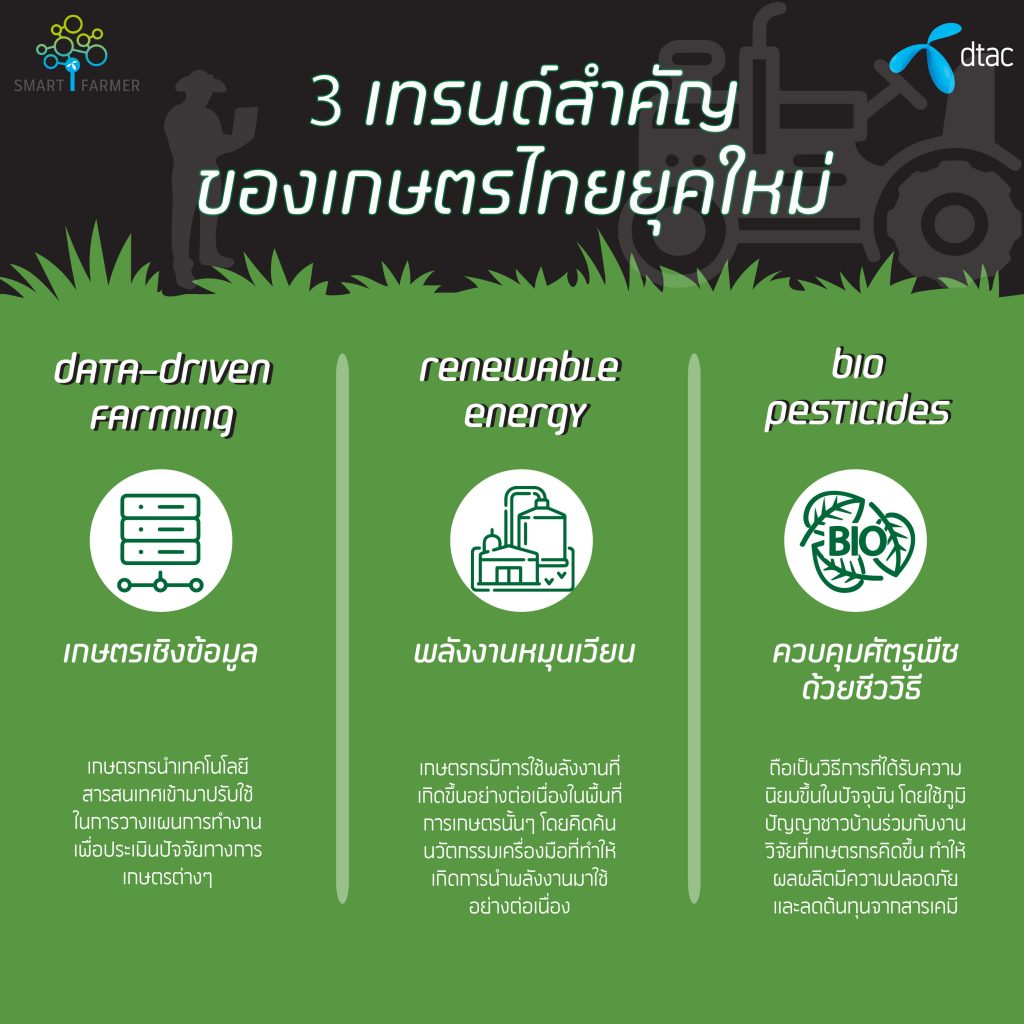
7 ธันวาคม 2560 – ดีแทค กรมส่งเสริมการเกษตร กระทรวงเกษตรและสหกรณ์ และมูลนิธิร่วมด้วยช่วยกันสำนึกรักบ้านเกิด เผย 3 แนวโน้มสำคัญเกษตรไทย ชูกลยุทธ์ “เกษตรเชิงข้อมูล – พลังงานหมุนเวียน – ชีววิธี” ขับเคลื่อนเกษตรครบวงจร ปูทางสู่ เกษตรกร 4.0 พร้อมประกาศผลเกษตรกรสำนึกรักบ้านเกิด ประจำปี พ.ศ. 2560 โดยนางสาวจิราวรรณ คำซาว เกษตรกรผู้เพาะเห็ดถั่งเช่าจากปุ๋ยชีวภาพ จากจังหวัดเชียงใหม่ ชูจุดเด่น “นวัตกรรม” พิชิตใจกรรมการ
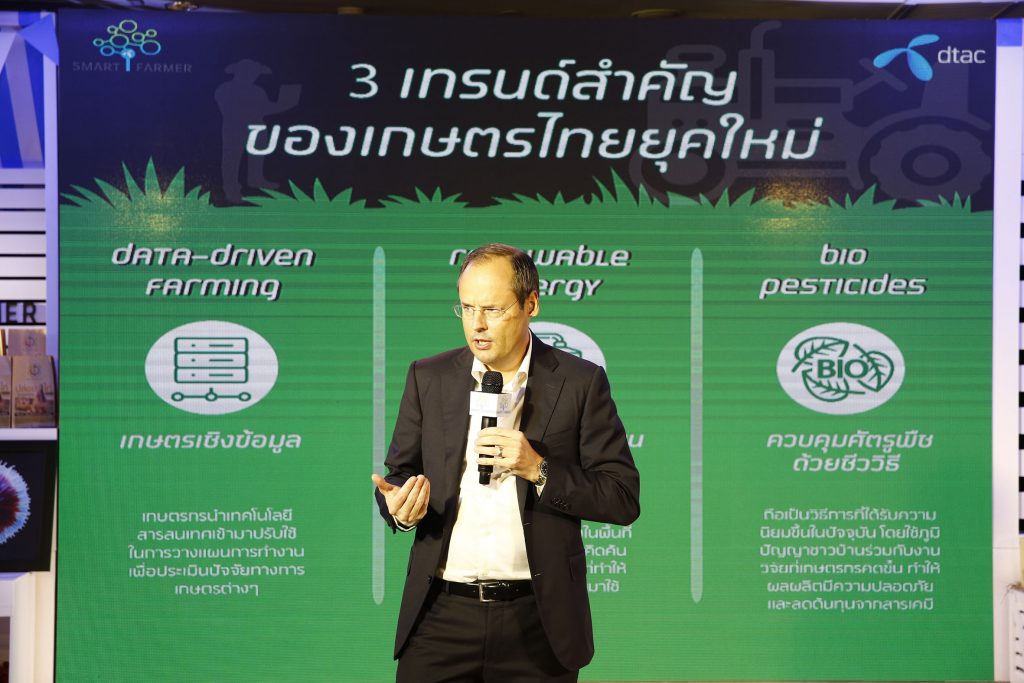
นายลาร์ส นอร์ลิ่ง ประธานเจ้าหน้าที่บริหาร บริษัท โทเทิ่ล แอ็คเซ็ส คอมมูนิเคชั่น จำกัด (มหาชน) หรือ ดีแทค กล่าวว่า จาก 9 ปีของการประกวด พบพัฒนาการของผู้เข้าประกวดอย่างมีนัยสำคัญ โดยเฉพาะอย่างยิ่งการวางแผนการเกษตรครบวงจร โดยใช้งานวิจัยและเทคโนโลยีเป็นฐานในการขับเคลื่อนธุรกิจ ครอบคลุมการผลิต การตลาด และการขาย โดยผสานกับภูมิปัญญาท้องถิ่นที่ตัวเองมี ซึ่งต่างจากอดีตที่เป็นเกษตรเชิงวัฒนธรรม ทำตามๆ กันจากรุ่นสู่รุ่น ซึ่งอาจไม่ตอบโจทย์ตลาดในปัจจุบัน
“ในอีก 2-3 ปีข้างหน้า ภาคการเกษตรไทยจะเปลี่ยนโฉมหน้าอย่างมีนัยสำคัญ โดยจะถูกขับเคลื่อนด้วยเทคโนโลยีการสื่อสารอย่าง 5G และอินเทอร์เน็ตสรรพสิ่ง (Internet of Things) ทำให้เกษตรกรต้องเตรียมพร้อมและปรับตัวต่อการเปลี่ยนแปลงที่จะเกิดขึ้น เช่น ปัญหาความมั่นคงทางอาหาร สภาวะโลกร้อน ปัญหาความยากจน ซึ่งทำให้เกิดทั้งความท้าทายและโอกาสเชิงเศรษฐกิจและสังคม” นายลาร์ส กล่าว
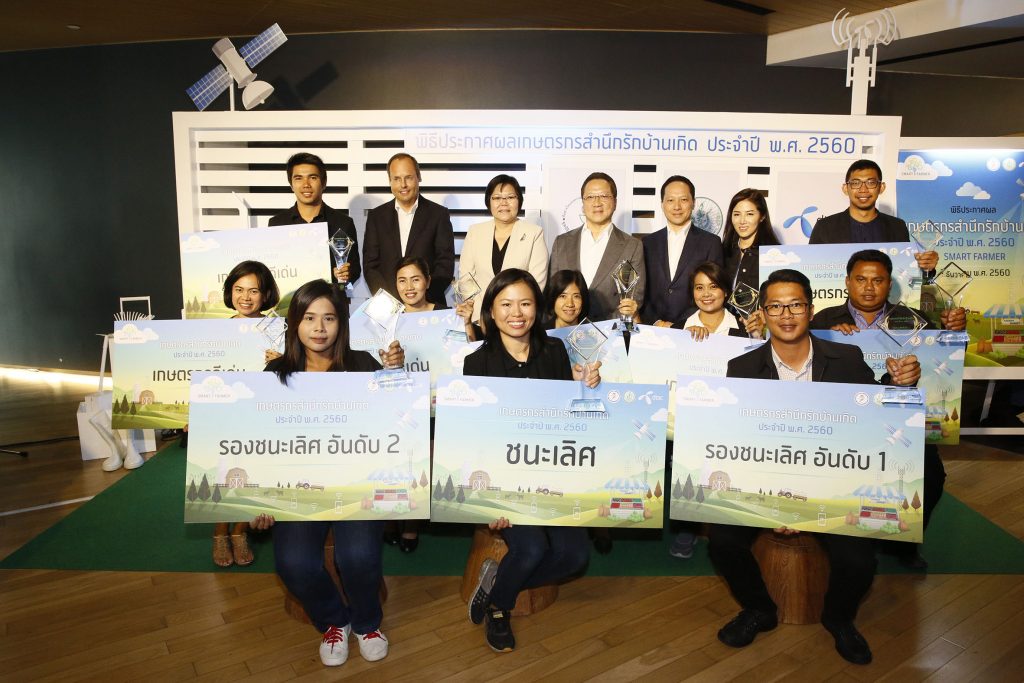
ทั้งนี้ จากผู้สมัครเข้าประกวดกว่า 80 คน ในปีนี้ พบแนวโน้มสำคัญของเกษตรไทยยุคใหม่ โดยแบ่งออกเป็น 3 เทรนด์ ได้แก่
1.เกษตรเชิงข้อมูล (Data-driven farming) เกษตรกรนำเทคโนโลยีสารสนเทศเข้ามาปรับใช้ในการวางแผนการทำงาน เพื่อประเมินปัจจัยทางการเกษตรต่างๆ ตลอดจนทำนายความต้องการของตลาดในแต่ละช่วงการผลิต ผ่านระเบียบวิธีวิจัยและสถิติอย่างเป็นระบบ ร่วมกับการวิเคราะห์ข้อมูลเปิดจากแหล่งอื่นๆ ทำให้เกิดความแม่นยำในการทำการเกษตร ลดต้นทุน เพิ่มคุณภาพของผลผลิต และสอดคล้องต่อความต้องการของตลาด
2. พลังงานหมุนเวียน (Renewable energy) เกษตรกรมีการใช้พลังงานที่เกิดขึ้นอย่างต่อเนื่องในพื้นที่การเกษตรนั้นๆ โดยคิดค้นนวัตกรรมเครื่องมือที่ทำให้เกิดการนำพลังงานมาใช้อย่างต่อเนื่อง ทำให้เกิดประสิทธิภาพในการผลิต และลดต้นทุนจากการใช้พลังงานในขั้นตอนอื่นๆ
3. ควบคุมศัตรูพืชด้วยชีววิธี (Bio-pesticides) ถือเป็นวิธีการที่ได้รับความนิยมขึ้นในปัจจุบัน โดยใช้ภูมิปัญญาชาวบ้านร่วมกับงานวิจัยที่เกษตรกรคิดขึ้น ทำให้ผลผลิตมีความปลอดภัยและลดต้นทุนจากสารเคมีได้ เช่น การคิดค้นปุ๋ยชีวภาพที่ผลิตจากเชื้อราไมคอร์ไรซาและเชื้อไรโซเบียม ช่วยในการเจริญเติบโตและป้องกันโรคพืชที่เกิดขึ้น
จากเทรนด์ที่เกิดขึ้นดังกล่าว พบว่ามีจุดร่วมสำคัญคือการใช้ “นวัตกรรมและเทคโนโลยีเชิงข้อมูล” เป็นฐานของการทำการเกษตร ตั้งแต่การวางแผน การวิเคราะห์ตลาด การเพาะปลูก การแก้ปัญหาโรคพืช ตลอดจนการส่งต่อถึงมือผู้บริโภค ซึ่งถือเป็นจุดเปลี่ยนสำคัญของเกษตรไทย โดยเฉพาะวิธีคิดและทักษะ พัฒนาคุณภาพชีวิตเกษตรกรไทย ตอกย้ำอุดมการณ์สำนึกรักบ้านเกิด

นางสาวภาณี บุณยเกื้อกูล ผู้อำนวยการกองพัฒนาเกษตรกร กรมส่งเสริมการเกษตร กล่าวว่า จากแผนยุทธศาสตร์การพัฒนาการเกษตรและสหกรณ์ 20 ปี (พ.ศ. 2560-2579) กำหนดว่า “เกษตรกรมั่นคง ภาคการเกษตรมั่งคั่ง ทรัพยากรการเกษตรยั่งยืน” โดยเปลี่ยนจากการเกษตรแบบดั้งเดิมในปัจจุบัน ไปสู่การเกษตรสมัยใหม่ที่เน้นการบริหารจัดการและเทคโนโลยี (Smart Farming)
สำหรับปี 2561 เป็นปีแห่งการยกระดับคน การบริหารจัดการมาตรฐานสินค้าเกษตร สู่เกษตร 4.0 กล่าวคือ เกษตรกรมีส่วนในการปรับเปลี่ยนโครงสร้างเศรษฐกิจที่ขับเคลื่อนด้วยนวัตกรรม (Value-based economy) โดยเกษตรกรต้องมีรายได้มากขึ้นและเป็นเกษตรกรผู้ประกอบการด้านการเกษตร (Entrepreneur) มากขึ้น เพื่อไปสู่การเป็น Smart Enterprises และ Startups ที่มีศักยภาพสูงต่อไป
“การส่งเสริมและพัฒนาเกษตรกร ในช่วงแผนพัฒนาเศรษฐกิจและสังคมแห่งชาติ ฉบับที่ 12 มุ่งเน้นให้เกษตรกรเป็นผู้ประกอบการด้านการเกษตร มีการจัดทำแผนการผลิตรายบุคคล (Individual Farm Production Plan – IFPP) ในการวิเคราะห์ กำหนดแผนการผลิตของตนเอง เพื่อไปสู่การผลิตที่มีคุณภาพ ได้มาตรฐาน ทำให้ผลผลิตที่เกิดขึ้นสามารถจำหน่ายได้ในราคาที่เหมาะสม เกษตรกรได้รับผลตอบแทนที่ดีขึ้นตามไปด้วย ทำให้การผลิตทางการเกษตรในลักษณะ smart agriculture เกิดความยั่งยืนในการพัฒนาและสร้างความอยู่ดีมีความสุขได้อย่างแท้จริง” นางสาวภาณีกล่าว
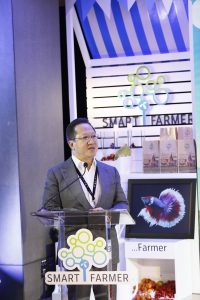
นายบุญชัย เบญจรงคกุล ประธานกรรมการ มูลนิธิร่วมด้วยช่วยกันสำนึกรักบ้านเกิด กล่าวว่า โครงการประกวดเกษตรกรสำนึกรักบ้านเกิด ได้ดำเนินการต่อเนื่องมาเป็นปีที่ 9 ปีนี้จัดขึ้นภายใต้แนวคิด “เกษตรแบบครบวงจร” โดยเน้นการใช้นวัตกรรมเป็นตัวขับเคลื่อนภาคเกษตรกรรม สอดคล้องกับยุทธศาสตร์พัฒนาประเทศ Thailand 4.0 ซึ่งเกษตรกรต้นแบบทั้ง 10 ท่านปีนี้ มีคุณลักษณะโดดเด่นในเรื่องทักษะการบริหารจัดการทรัพยากรที่ดิน แรงงาน ทุน ตลอดจนการเพาะปลูกและแปรรูปสินค้าที่สอดคล้องกับความต้องการของผู้บริโภค อยู่บนพื้นฐานการใช้องค์ความรู้ ความคิดสร้างสรรค์ ตลอดจนการนำภูมิปัญญาท้องถิ่นเข้ามาประยุกต์ใช้กับนวัตกรรมสมัยใหม่ เพื่อยกระดับผลิตภัณฑ์การเกษตรให้มีคุณภาพมากขึ้น
“นอกจากนี้ ยังมีทักษะความเป็นเกษตรกรมืออาชีพ สามารถใช้เทคโนโลยีเพื่อเข้าถึงข้อมูลข่าวสาร และนำมาใช้ในการบริหารจัดการเกษตรได้อย่างมีประสิทธิภาพ เปลี่ยนการเกษตรดั้งเดิมสู่เกษตรสมัยใหม่ รู้จักการวางแผนธุรกิจ ใช้เทคโนโลยีและนวัตกรรมสร้างการตลาดนำการผลิต พร้อมแบ่งปันบทเรียนและถ่ายทอดประสบการณ์แก่เกษตรกรทั่วไป มูลนิธิฯ มีความภาคภูมิใจเป็นอย่างมาก เพราะปีนี้ นอกจากเราจะได้เกษตรกรต้นแบบ 10 ท่านที่เป็นคนเก่ง เรายังได้เกษตรกรที่มีความภูมิใจในการเป็นเกษตรกรอย่างยิ่ง พร้อมคำนึงถึงคุณภาพสินค้าและความปลอดภัยของผู้บริโภค สังคมและสิ่งแวดล้อมอีกด้วย” นายบุญชัย กล่าว
รายชื่อผู้ชนะเลิศ โครงการประกวดเกษตรกรสำนึกรักบ้านเกิด ประจำปี 2560
จากการพิจารณาของคณะกรรมการ ได้ตัดสินให้
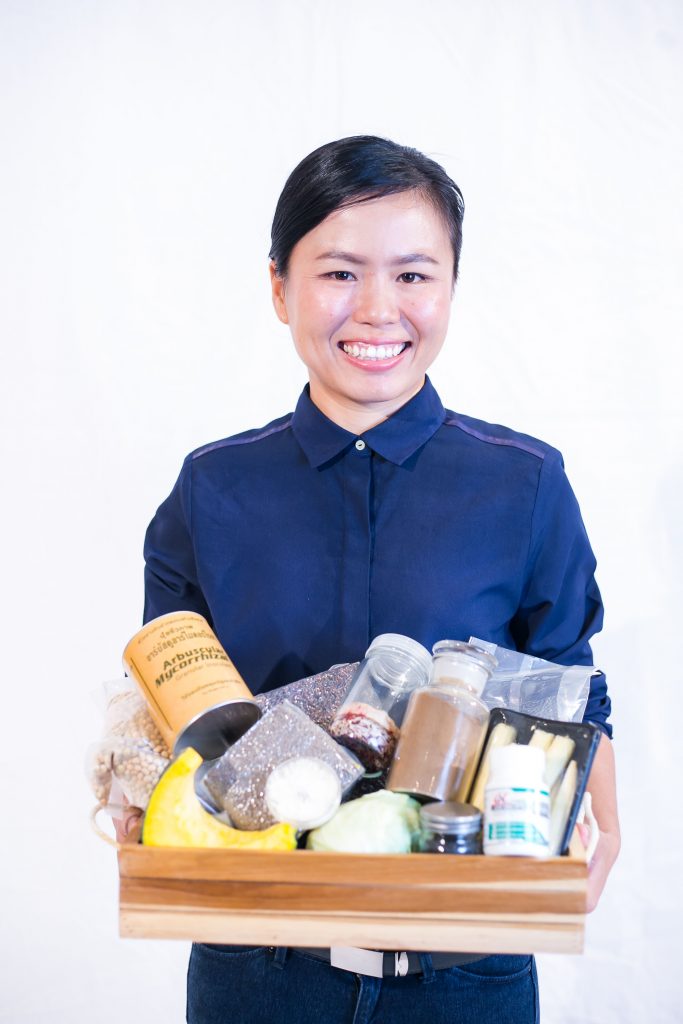
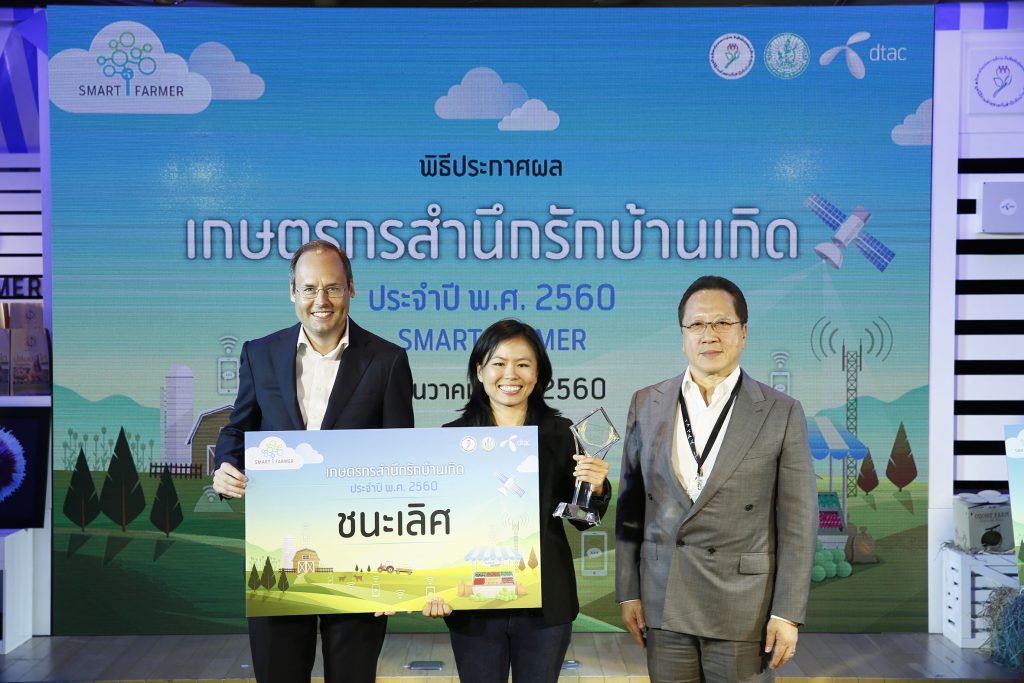
เกษตรกรหัวคิดแบบนักวิจัย นางสาวจิราวรรณ คำซาว เกษตรกรผู้เพาะเห็ดถั่งเช่าจากปุ๋ยชีวภาพ จากจังหวัดเชียงใหม่ เป็นผู้ชนะเลิศ โครงการประกวดเกษตรกรสำนึกรักบ้านเกิด ประจำปี พ.ศ. 2560 โดยชูจุดเด่นด้าน “นวัตกรรม” พัฒนาสินค้าเกษตรอินทรีย์ตั้งแต่ต้นน้ำถึงปลายน้ำ ตรงกับความต้องการของผู้บริโภคในปัจจุบันและมีแนวโน้มเติบโตในอนาคต โดยนำความรู้ที่เรียนในระดับปริญญาเอก มาต่อยอดพัฒนาปุ๋ยชีวภาพทดแทนการใช้ปุ๋ยเคมี สร้างแบรนด์ของตัวเอง ทั้งยังใช้เทคโนโลยีคิวอาร์โค้ด ทำให้ผู้บริโภคตรวจสอบที่มาของสินค้าได้ นอกจากนี้ ยังรวมกลุ่มกับวิสาหกิจชุมชนกระจายรายได้สู่ท้องถิ่นที่อยู่
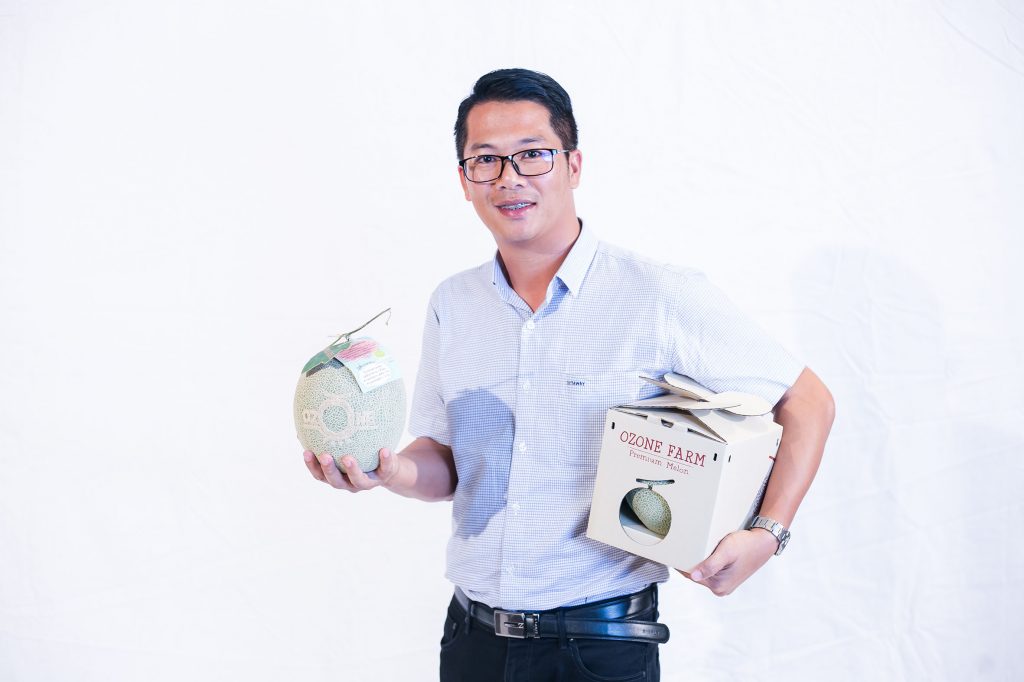
รองชนะเลิศอันดับ 1 ได้แก่ นายพิเชษฐ์ กันทะวงศ์ เกษตรกรผู้เพาะปลูกเมล่อน ภายใต้แบรนด์โอโซนฟาร์ม จากจังหวัดเชียงราย โดยยึดหลักเกษตรอินทรีย์ ปลูกพืชโดยไม่พึ่งสารเคมี เป็นทางเลือกใหม่เพื่อสุขภาพที่ดีกว่าของผู้บริโภค ภายใต้การบริหารจัดการและควบคุมคุณภาพผลผลิตที่ยึดมั่นตามมาตรฐานหลักการทำเกษตรที่ดีของกระทรวงเกษตรและสหกรณ์ (GAP) นอกจากนี้ ยังสร้างแบรนด์ด้วยการตลาดออนไลน์ผ่านเฟสบุกแฟนเพจ โดยมีผู้ติดตามกว่า 42,000 คน และพัฒนาสร้างสรรค์ผลิตภัณฑ์หรือสินค้าใหม่ๆ ที่ต่อยอดจากเมล่อนอีกหลายรายการ
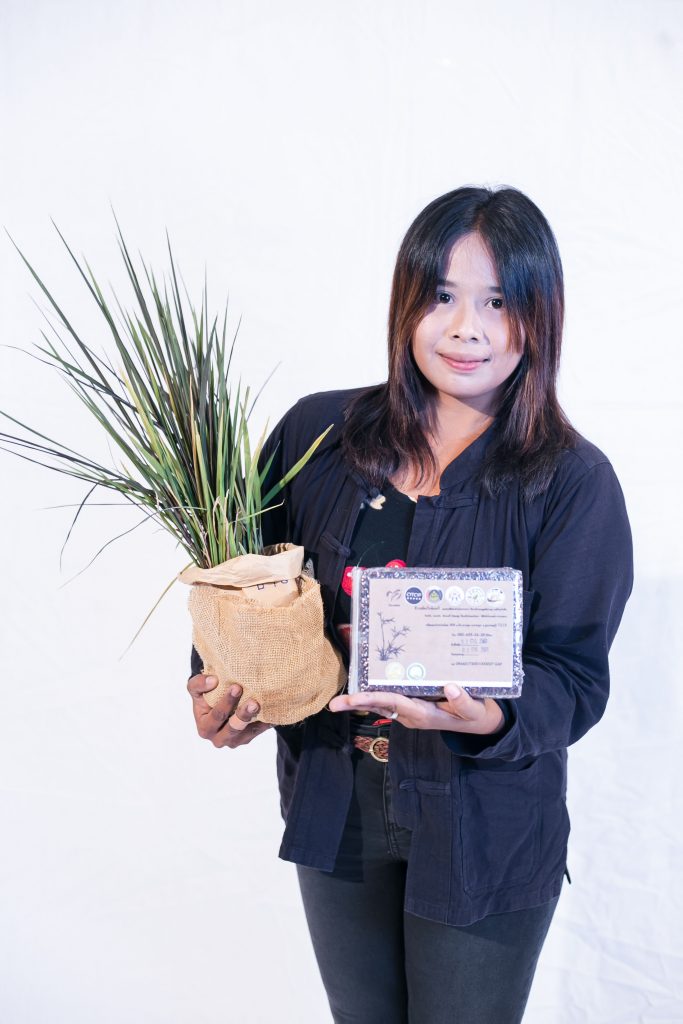
รองชนะเลิศอันดับ 2 ได้แก่ นางสาวสิริพร เที่ยงสันเที้ยะ เกษตรกรยุคดิจิทัล ผู้ปลูกข้าวไรซ์เบอรี่จากไร่พวงทรัพย์ จังหวัดสุพรรณบุรี ที่ต้องการปรับเปลี่ยนรูปแบบการทำนาในอดีตที่ใช้สารเคมีอย่างหนักในการกำจัดศัตรูพืช มาเป็นการทำนาแบบปลอดสารพิษ เพราะเล็งเห็นว่าการรับประทานข้าวที่ปลูกโดยสารเคมีนั้น ไม่ต่างจาการรับประทานข้าวอาบยา ซึ่งมีอันตรายต่อร่างกายเป็นอย่างมาก โดยใช้นวัตกรรมสมัยใหม่ผสานกับภูมิปัญญาไทย โดยประยุกต์การตากข้าวแบบธรรมชาติร่วมกับเทคโนโลยีการสีและบรรจุหีบห่อด้วยเครื่องสุญญากาศ ทำให้การเก็บรักษามีอายุที่ยาวนานขึ้น
Smart Farmer Awards unveils Thailand’s agricultural trends
Dec 7, 2017 – Smart Farmer Awards has released the results of its analysis of 10 contestants entered for the contest this year to establish key trends of agriculture in Thailand.
Data-driven farming, renewable energy and bio-pesticides are the factors taken into account by Smart Farmer Awards, a joint collaboration between the department of Agriculture Extension, Rak Ban Kerd foundation and dtac, in a bid to seek young talents in Thai agricultural industry. One third of Thai population is represented in agriculture.
“As a collection of this year’s contestants, Smart Farmer Awards show how technology and innovation are evolving in agriculture,” said Lars Norling, chief executive officer at Total Access Communication Plc.
Major trends highlights are:
Data-driven farming
The thoughtful use of big data to supplement on-farm precision agriculture. It means having the right farm data, at the right time, to make better decisions that reduce cost, raise products’ quality and improve long-term profitability.
Renewable energy
The use of renewable energy in farming systems includes generation of power to do a number of farm tasks: pumping water for irrigation, lighting farm buildings, powering processing operations etc. it reduces farmer’s vulnerability to the rising price of oil and related sources of energy. Renewable energy technologies play an important role all over the world to approach sustainable development.
Bio-pesticides
Following the growing environmental concerns over health safety, bio-pesticides are very effective in the agricultural pest control without causing serious harm to ecological chain or worsening environmental pollution, particularly in Thailand, where has a biological diversity. The development of biopesticides stimulates modernisation of agriculture and will, without doubt, gradually replace chemical pesticides.
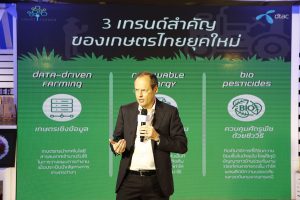
Mr.Norling said Thai agriculture will be facing major disruptions in the next few years, driven by the advent of internet of things (IoT) and 5G, that will pose both positive and negative impact. Internet has affected several industries by digitizing their core business, including agriculture. The industrial revolution in agriculture strongly requires a preparation and adaptive ability in its workforce.
Over the past nine years, dtac has seen a significant development of Thai farmers, especially young age group. They have embraced information technology and internet to apply on their farm, resulting in effective management in agricultural ecosystem, which ranges from planning, cultivating, harvesting and sales. Interestingly, the use of modern technology and local wisdom was also applied.
Mr.Lars said from 3 key trends in agriculture, they share a common base of information technology and innovation in order to plan, collect and analyse data, harvest and distribute products. This is the game changer of Thai agriculture, especially skill and mindset of entrepreneurship of Thai smart farmers.
Panee Boonyaguakul, director of farmer development division, said the department’s mission is to transform traditional to smart farmers, focusing on technology adoption and management under its vision of stable farmers, prosperity agriculture and sustainable farming resources. This mission is in line with Agriculture and Cooperative ministry’s 20-year plan (2017-2036).
For the year 2018, its priority is to raise human resources and product quality in the sector towards the so-called Farming 4.0, which is the shift of economy from industrial to value-based. Farmers is expected to have more income and become a smart enterprise and high potential startup.
“Promoting and developing farmers under the national economic and social development plan of 12nd edition, it aims to promote individual farm production plan (IFPP) for Thai farmers in analysing, planning and standardising their products to another level. This will lead to a reasonable price, allowing farmers to gain better income, bring a sustainable agriculture and a happy life ultimately,” said Ms.Panee.

Boonchai Bencharongkul, chairman of Ruam Duay Chauy Kan Sam Nuek Rak Ban Kerd Foundatioin, said the 9th edition of Smart Farmer Awards is organised under the theme of integrated agriculture” by leveraging the use of technology in line with the government’s Thailand 4.0 initiative. The finalists of 10 farmers consist outstanding characteristics in creativity and managing skill across resources: land, labour, capital and market planning. Moreover, the mix between local wisdom and innovation was embraced to raise the bar of their products.
“In addition, they (the 10 finalists) are very professional in accessing to information and applying to farming management effectively, transforming traditional to smart plant growers. They use market-led thinking to create innovation and are ready to share with their peers. The Foundation is proud of them of being farmers with consumer-centric and eco-friendly consciousness,” said Mr.Boonchai
The winners list Winner
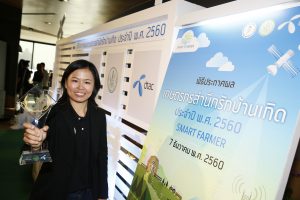
Ms.Jirawan Khamsour, a cultivator of organic golden Cordyceps from Chiang Mai province, champions the awards by greatly showing her ability to use innovation and research in agricultural planning, covering a whole ecosystem from upstream to downstream. She differentiates traditional farming with market-led strategy, while traditional farmers struck with supply side.
Additionally, the PhD degree holder also brought what her possessed during her study to develop bio-fertilizer and create her own brand. Her product is traceable by using quick respond code (QR code), ensuring customers will get genuine products. She also joined forces with members in her community for wealth distribution.
First runner-up
Mr.Pichet Gunthawong, a melon grower from Chiang Rai province, chose to cultivate organic melons under the Good Agricultural Practices (GAP) standard. He also created his own brand under the name of Ozone Farm via Facebook fan page with the followers of more than 42,000 currently. He also plans to produce more processed melon products.
Second runner-up
Ms.Siriporn Tiengsantia, a rice berry grower from Supanburi. She is determined to revolutionise cultivating culture from heavy use of chemical fertiliser to organic farming, due to a serious harm of eating chemically fertilised rice. She embraced both local wisdom and modern technology on her rice farm in order to extend her product lifespan.
เรื่องมาใหม่
- (คลิป) เริ่มที่พะเยา คนไทยสร้าง คนทั้งโลกเป็นเจ้าของ ทุ่มงบ 5,000 ล้านบาท ไม่ใช้งบจากราชการ สร้าง “อัครมหาวิหาร” สิ่งมหัศจรรย์สูงที่สุดในโลก 217 เมตร
- SUN ประชุมผู้ถือหุ้นประจำปี 2567 ในรูปแบบ Hybrid Meeting
- สธ.แม่สะเรียงเสริมทักษะเจ้าหน้าที่ชายขอบ ป้องกันควบคุมโรคไข้มาลาเรีย
- realme เปิดตัวสมาร์ทโฟนในราคาหลักพัน แบบคุ้มๆ ทั้ง “realme 12 5G” และ “realme 12X 5G” กับ Lossless 3X Zoom รุ่นแรกในระดับราคาเดียวกัน
- จัดยิ่งใหญ่ ผวจ.แม่ฮ่องสอน เปิดงานประเพณีปอยส่างลอง หมู่บ้านชายแดน และเป็นงานปอยส่างลองงานสุดท้ายของปี 2567






